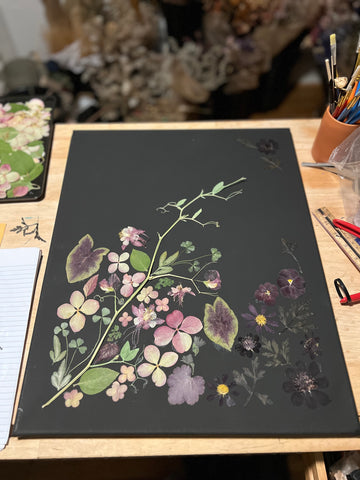Light and Shadow Collection
Share
Design
Many of the Dutch-Masters painters (1600-1750) created floral still-life paintings. I'm captivated by their style for creating light and shadows. Before transitioning into using pressed and preserved flowers, I designed with fresh florals. I would often attempt to recreate the Dutch-Masters style and those can be seen in past photographs of my arrangements.
Notes on the Light and Shadow Collection
They might be out there, but I hadn't seen art done with pressed flowers in this style. I decided to try it out and see where it led me. . After harvesting, I pressed the flowers using a two-step process with a traditional wood press. My desire was to create a dark and light style on a black background. This collection is named Light and Shadows for that reason. This art design was inspired by a painting style, used by the Dutch Masters in the late 15th through 17th century. This method of painting showcased the interplay between light and dark. I think creating in this way showcases the beauty of each flower, stem, tendril, leaf, and petal for a truly unique floral piece.
The process took some time to figure out, but eventually I started taking a photo of the progress and then would switch the photo to black and white. This enabled me to see how much of the lighter space and darker space I was using for darker and lighter flowers. I was hoping to move into a 1/3 and 2/3 ratio and I think it ended up landing pretty close to that.


Palette
This piece features a palette of rich colors which include: olive, mossy greens, mauves, amethyst, plum, goldenrod and saffron.
Art Options
Rather than sell the original pressed flower piece, I decided to create other items from the original. I had it scanned at a high end floral gallery and then had Giclee prints and canvases created. They are available in three sizes and an the option of a rolled canvas or a stretched and ready to be hung canvas. Another variety is the Giclée paper print, which has been printed on either hot press or cold press 100% cotton archival paper and also in three sizes. If you would rather wear your art, you can do that with our soft wearable black T-shirt which has a screen printed white version of Light and Shadows on the front of the shirt.
Flowers
Some of the flowers included in this piece: Hydrangeas, Sweet Peas, Arrowhead Philodendron, Dahlias, Cosmos, Spirea, Cloverleaf ferns, Fuchsia, Maidenhair fern, Heuchera, Allium, Begonia, Dianthus, Cretan Brake fern, Squirrel's-Foot fern, and Spirea.
Flower Process
Flowers were harvested and then placed in layers in my wooden presses. They were repressed after 24-36 hours and then dried in the presses for three-four weeks. They were then sorted and placed in drawers based on the color palettes. When I first began this process, I pulled many pressed flowers options for the palette. I then pared down the colors and remained with a cohesive palette which I thought would work well for the art piece. This is a long process, sometimes close to a month and a half from harvest time until the flowers are ready to use in the art.
Gluing
Each and every leaf, petal, tendril, stem, and piece of the flower is then glued to the surface of the canvas or paper. I use a UV protectant glue and I slowly begin the process. Items needed: a myriad of paintbrushes, several styles of tweezers, a magnifier glass, a damp cloth, a lot of patience and good music. The process typically takes several days up to a couple of weeks to complete. It just depends on how large the piece is and how delicate the flowers are.
'Light and Shadows" original artwork, Present Season Floral Artistry.

